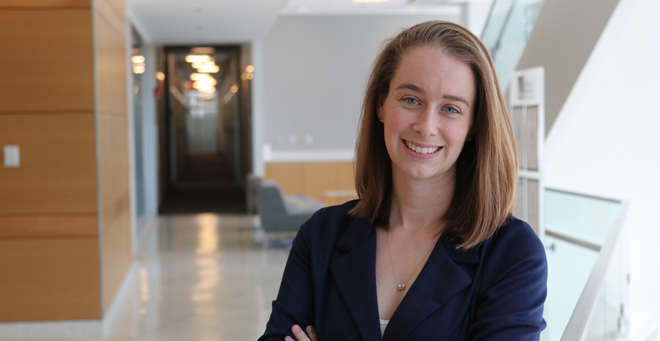 |
|
|
Jill Moore |
From an early age, Jill Moore was fascinated by the human genome. Her first career goal was to become a genetic counselor, but her love of mathematics and research collaboration pulled her in a different direction: bioinformatics and computational biology.
“I grew up in the era when the textbooks were just starting to talk about sequencing the human genome; it was a very exciting time in the field of biomedical science. I wanted to know how this knowledge could be applied to human disease. What analysis can be done to benefit the human condition?” Moore said.
On June 3, Moore will join her fellow PhD candidates in the Graduate School of Biomedical Sciences Class of 2018 as they’re awarded their degrees during UMass Medical Schools’ 45th Commencement. Moore, who has been selected as the GSBS class speaker, will share her experience on the importance of collaboration in scientific research.
“Here at UMass, we have the ideal environment for collaboration, whether formal or informal. I think it’s important for graduating students to try to bring this sense of camaraderie with them to their future projects and endeavors,” said Moore, a Falmouth resident and UMass Amherst graduate.
In 2012, Moore’s questions and curiosity brought her to the lab of Zhiping Weng, PhD, the Li Weibo Chair in Biomedical Research, professor of biochemistry & molecular pharmacology and director of the Program in Bioinformatics & Integrative Biology. Since then, she has spent the better part of the past five years working on the third phase of the National Human Genome Research Institute Encyclopedia of DNA Elements (ENCODE) consortium project of the National Institutes of Health, in addition to several collaborations with fellow UMMS researchers.
“I was very focused. I knew that I wanted to go into the field of bioinformatics and computational biology and that I wanted to work with Zhiping,” said Moore, who defended her dissertation, Defining a registry of candidate regulatory elements to interpret disease associate genetic variation, in October 2017 and is now the project manager for the latest generation of the ENCODE project, ENCODE 4.
The respect was mutual. According to Dr. Weng, Moore “is computationally superb and very knowledgeable of important biological problems. Moreover, she is highly conscientious and always gives all her effort to all her projects. Jill has also shown tremendous leadership, which is essential for the role my lab plays in the ENCODE project.”
“As a graduate student, Jill made many research presentations to the entire ENCODE consortium and won the best presentation award two years in a row during the consortium meetings. It is a joy to work with her,” Weng said.
The ENCODE 4 consortium has more than 500 members. The Weng Lab is leading the data analysis effort. Moore said the lab’s goal is to build off of what’s been done in ENCODE 3 and to synthesize the data to make it usable for the community.
“During phase 3, we predicted regions of the genome that may control gene expression, referred to as regulatory elements. Now for phase 4, we plan to work with ENCODE 4 collaborators to experimentally test these regions for regulatory activity. We also plan on integrating new types of data, such as 3D genome interactions, to identify the genes that these regulatory elements target,” she said.
Part of her work as a graduate student was to focus on methods for identifying and cataloging regions of the genome that control gene expression, referred to as “regulatory elements,” by integrating different types of genome and epigenomic data as part of ENCODE 3.
“By combining hundreds of epigenomic datasets, we defined over a million regulatory elements in the human genome, and with machine learning approaches, we predicted the genes that they may regulate. We then analyzed genetic variants associated with psychiatric disorders within the context of all these regulatory elements. We found that these genetic variations were enriched in regulatory elements that control gene expression in the brain. We are working with collaborators to test these predictions in mouse models and are expanding our approach to other disease models,” she said.
In addition to her work on ENCODE 3, Moore collaborated with several UMMS researchers including the lab of Fen-Biao Gao, PhD, the Governor Paul Cellucci Chair in Neuroscience Research and professor of neurology. In May 2018, Moore contributed as co-first author to work published in Cell with colleagues from the lab of Melissa J. Moore, PhD, professor of RNA therapeutics.
Moore’s collaborative spirit extended beyond the lab. As one of the founding members of the GSBS Bootstrapper organization, a student-led group facilitating informal learning communities among GSBS students and postdocs, she taught colleagues computer programming languages, such as Python, to improve their efficiency in translating and analyzing large data sets. She was also an active teaching assistant for several GSBS courses.
Related story on UMassMedNow:
In Bootstrapper workshops, student experts share knowledge with fellow students